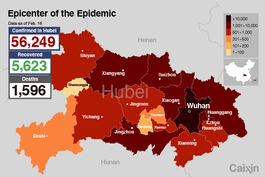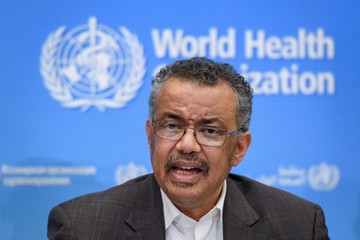More than two months have passed since the World Health Organization (WHO) announced on March 10, with notable delay, that Covid-19 had spread and the dangerous pandemic required strict sanitary measures.
After more than two months of strict economic shutdowns in the United States, Europe and other countries, the world is in a deep economic recession (with the exception of China, which has become a global source and supplier of medicines and other essential products).  And the sudden stoppage of almost all production activities for such a long time threatens to lead to a world economic depression similar to or even worse than that of 1929.
And the sudden stoppage of almost all production activities for such a long time threatens to lead to a world economic depression similar to or even worse than that of 1929.
Therefore, I very much doubt that the strict closure of the economic activities during such a long time was justified or that it is justified to extend it even further. An economic depression like the one suffered on the last century can lead to millions of deaths caused by suicide, starvation, lack of sufficient resources to face essential health care expenses and a sharp deterioration of the levels of well being enjoyed by most countries until now. Economist Brian Wesbury predicted that keeping the US economy closed until Easter would cost the economy 3% of its capacity; until the end of April, 8%; and until the end of May, 15%. He was short in his predictions; that is exactly the contraction the US has already suffered by early May – three weeks before it was foreseen! And US unemployment rates rose from an all time low in January (just above 3%) to 16% as of today, the highest level since the Great Depression.
Indeed, this pandemic, and the experimental attempts to mitigate and control it, have created a series of challenges and debates that go beyond epidemiology and medicine. Once, and again, and again ... some authoritative person is in favor of some policy or solution and the next hour some other expert is rejecting that course of action. Simply put, the world (except China) was not prepared for this pandemic. The world lacked testing kits, masks, surgical gloves, ventilators and other required health care items (not counting the fact that stopping production has caused shortages in practically all consumer goods) and it is desperate trying to get them from China or is trying to introduce the necessary reforms in many factories and industries to produce them in sufficient quantities to face the crisis. But these actions take too long and the damage is already done.
To be sure, the pandemic is not the cause of all the confusion surrounding the relationship between morality, economics, and the advance of reliable scientific knowledge pertaining to how we best meet societies' needs. The situation has been grossly politicized, especially in the United States and in some European countries. When had it been experienced in a democratic country that the political opposition did not close ranks with the President or the Prime Minister in such times of tribulation? That is exactly what is happening. It is pitiful and outrageous, as if the crisis was an instrument to achieve more power and take it away from those in government who are trying to confront it.
Meanwhile, the Chinese government failed to prevent the world about the impeding danger since late October, allowing the virus to spread and the crisis eventually to get out of control. China has prevented as well any kind of international investigative team to visit Wuhan and the laboratory in that city where the virus is suspected to have originated. As is now well known, Li Wenliang, the doctor who first sounded the alarm about the virus’s outbreak in the province of Wuhan (and who subsequently died of the virus), was disciplined by the Chinese government for “spreading rumors” injurious to the state. More recently, Ai Fen, the head of emergency at the Wuhan Central Hospital, gave an interview condemning the government for its lies about the virus—specifically, its denial that the virus was transferable between humans—and she has since disappeared.
 WHO's Director General, Dr. Tedros Adhanom Ghebreyesus, called several press conferences during the following weeks insisting that there was no pandemic and asserting that the outbreak was under control with proper prophylactic measures. In the meantime, he traveled to Beijing on January 28 to meet China’s leadership and to offer technical and scientific assistance. On January 30, WHO reported that human-to-human transmission was limited, according to Chinese sources. However, a WHO's situation report reported on the same day 7818 total confirmed cases worldwide, with the majority of these in China, and 82 cases reported in 18 countries outside China (find further information HERE).
WHO's Director General, Dr. Tedros Adhanom Ghebreyesus, called several press conferences during the following weeks insisting that there was no pandemic and asserting that the outbreak was under control with proper prophylactic measures. In the meantime, he traveled to Beijing on January 28 to meet China’s leadership and to offer technical and scientific assistance. On January 30, WHO reported that human-to-human transmission was limited, according to Chinese sources. However, a WHO's situation report reported on the same day 7818 total confirmed cases worldwide, with the majority of these in China, and 82 cases reported in 18 countries outside China (find further information HERE).
It is also worth noting that Taiwan reported its concerns about the severity of the coronavirus to the WHO in late December but was ignored. Taiwan, we might recall, was barred from participating in the WHO in 2016 at China’s insistence. Despite Taiwan’s early warnings and subsequent success containing the coronavirus, it was excluded from attending, even as an observer, the Emergency Committee meeting convened by the WHO on January 22 and 23 to determine the severity of the virus and the potential for a pandemic. 
Nevertheless, Anthony Fauci, director of the National Institute of Allergy and Infectious Diseases, did not warn yet about the risks of the virus as late as January 26. During a radio interview with host John Catsimatidis, he said that the American public shouldn’t worry about the coronavirus outbreak in China. “It’s a very, very low risk to the United States ... It isn’t something that the American public needs to worry about or be frightened about, because we have ways of preparing and screening of people coming in [from China].” Fauci said. That's why it was so sad and unfortunate how the press bitterly criticized President Trump, and even accused him of being a racist, when he closed US borders to China on February 2. Fauci and many other public health officials have since praised that decision, but many experts and a wide sector of the press still opposes the measure.
In the meanwhile, some leaders argue that lockdowns must continue until there is a vaccine, no matter the economic repercussions; other voices speak only of the economy and its needs; while some, just refer to the erosion of liberty citizens are facing now and may be facing into the future. But it is an illusion to think that we can separate our physical, spiritual, and economic realities. Not only it is an incoherent idea – it is quite dangerous. A crisis as serious as this requires a united front of active support to governments. This does not mean that criticism should be silenced, but having enough reasons to disagree, it is imperative to channel criticism through dialogue, cooperation and with clear and viable alternative solutions.
The truth is, liberty, health and prosperity are all essential and complementary to the right ordering of the good society. Achieving an equilibrium to be able to recover from this tragedy is only possible with the full cooperation from all sectors of society, including the politicians ... and an unbiased press!
Comments powered by CComment